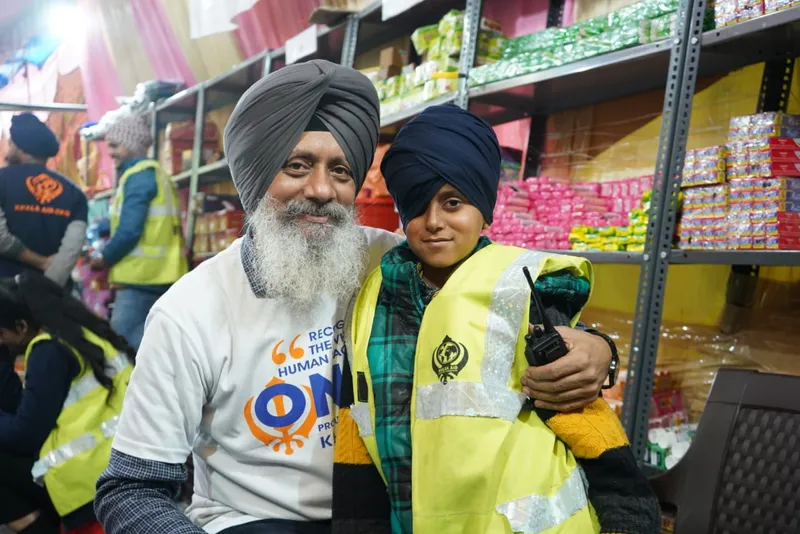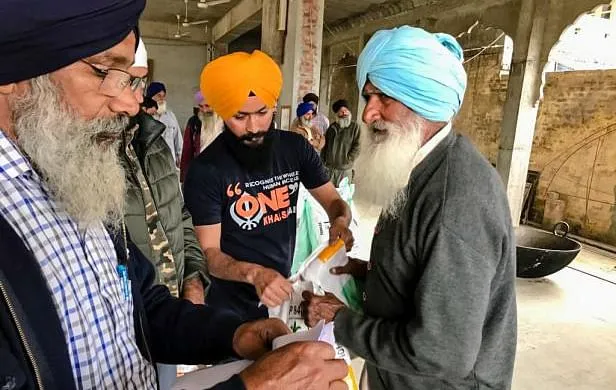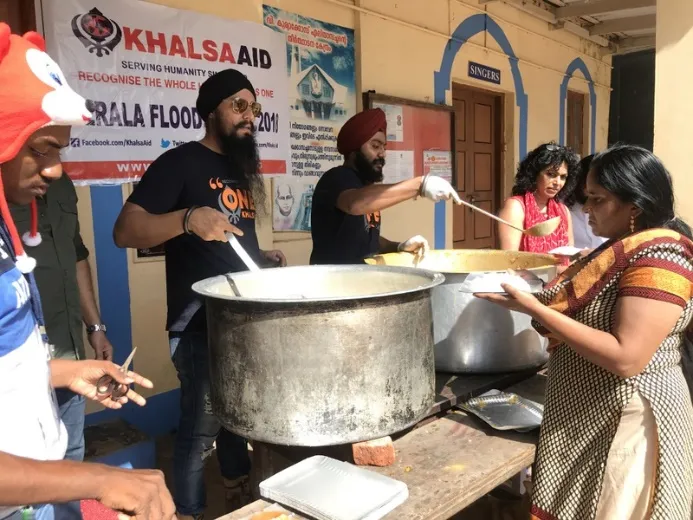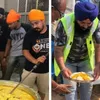Selfless service without discrimination: how Khalsa Aid India helps those in distress
Despite many controversies, Khalsa Aid India, an arm of the international organisation of the same name, has been helping people across the country during natural and manmade disasters without any discrimination or bias.
A little boy named Sargun Singh from Amritsar, Punjab was diagnosed with cancer in his eye, to the extent, the growth was visible outside the eye. The doctors said he wouldn’t survive beyond two-three months and his parents lost all hope.
A group of volunteers came across the boy’s story and decided to help him. They directed his parents to the LV Prasad Eye Institute in Hyderabad for treatment.
The team flew him to Hyderabad, where the doctors told them there was still hope. They started treatment and while the recovery took a while, he was completely healed.
Even though they couldn’t save his eye, they still saved his life. The boy decided to join these volunteers and help them in making a difference in the lives of others. The organisation? Khalsa Aid, well-known for its philanthropic activities throughout the world.

Sargun Singh is now a part of Khalsa Aid India
Founded by Ravi Singh, is an international organisation providing crucial aid to millions of people around the world since 1999 - to victims of the Yemen civil war, refugees landing on the shores of Greece from the Middle East; and, more recently, the Rohingyas from Rakhine state in Myanmar seeking refuge in Bangladesh.
While the international arm has left a mark in 22 countries, Khalsa Aid India has been working along the same principles in the Asia-Pacific region under the leadership of Amarpreet Singh. Operational since 2013, it has not only been responding in the aftermath of disasters and conflicts across India, but has also carried out relief operations in Nepal, Bangladesh, Myanmar, and Sri Lanka.
“Since 2013, we’ve been working in disaster zones, where people are in distress and are looking for help. From the Kerala floods to the anti-CAA protests in Delhi, we are on a mission to help everyone who needs it,” Amarpreet tells SocialStory.
Khalsa Aid India
Khalsa Aid India has been active for the past seven years, even aiding protesters during difficult times. Be it setting up langars, (community meals), distributing ration kits and other essentials, the organisation has lent a helping hand during unprecedented times.
‘Khalsa’, Punjabi for ‘pure’, is an apt descriptor for an organisation that does not discriminate on the basis of caste, creed, race, gender, or religion or any other, aiming to serve communities with the “purest” of intentions.

Credits: Daisy Mahadevan
Its strong volunteer base in different states helps Khalsa Aid to act swiftly in times of disasters and calamities.
“We have over 25,000 volunteers who are the backbone of our organisation. People from different walks of life and social backgrounds volunteer their time to ensure we are able to respond quickly,” says Amarpreet.
Gurpreet Singh, who joined as a volunteer in 2014 during the Saharanpur riots, and now an administrator, became a part of the organisation after learning about the selfless work they have been doing.
“Whenever we came across any distress situation, we found that Khalsa Aid was out there, spreading values of selfless service across the people, and I knew I had to be a part of it,” Gurpreet tells SocialStory.
Khalsa Aid India responds to and provides aid to survivors of natural, and manmade disasters in India, as well as Nepal, Bangladesh, Myanmar, and Sri Lanka.

Seed distribution in Punjab
It started operations in 2013, during the Uttarakhand flash floods, the result of an unprecedented cloud burst. Homes were completely destroyed, roads were washed way, and essential infrastructure across the state was rendered ineffective. Pilgrims who were stranded in the religious and spiritual sites had to walk down the mountain to safety.
Khalsa Aid was one of the first to respond to the emergency. Amarpreet recalls, “Our volunteers provided exhausted pilgrims with food and water, which was highly appreciated. Later, as part of the second phase of relief efforts, we distributed 1,000 ration kits and non-food items to the local population who were struggling to rebuild their lives post floods.”
When Kerala was hit by floods in 2018, following unexpected heavy rains, a team of Khalsa Aid India volunteers from different parts of India and the world came together to help the state.
“We were able to collect about 400 tonnes of aid material - dry rations, clothes, hygiene, sanitation, footwear and other items. We also set up community kitchens and prepared about 8,000 meals a day from different locations,” says Amarpreet.

Food distribution during the Kerala Floods 2018
In fact, they are still working on the aftermath of the floods and have renovated about four schools in the state and also rehabilitated about 15,000 families. They also restored other infrastructure and livelihoods, apart other initiatives.
Similarly, they also provided relief efforts to Pithoragarh district, seed distribution in Punjab, Punjab floods, Maharashtra drought relief, Odisha floods, and many others.
They are currently with those affected by the Uttarakhand floods that happened this month, believed to be caused by an avalanche or a glacial lake outburst.
It also has laid out long term plans for the organisation that can be categorised largely under education, health and welfare in India.
Relief during the pandemic
Khalsa Aid India started planning and executing its relief operations during mid-March in the wake of the COVID-19 pandemic. On March 20, the team addressed the need for bodysuits in Nawanshahr, the first city in Punjab to have a COVID-19 patient. Subsequently, 280 bodysuits were delivered to Rajindra Hospital, Patiala to facilitate the healthcare process. Within 45 days they distributed about 45,000 PPE kits to more than 13 cities in Punjab, Rajasthan, Mumbai, and other states.
“We supplied sanitisers and masks in all districts of Punjab as well as the surrounding states of Haryana, Rajasthan, Delhi, Jammu and Kashmir, Maharashtra (specifically Mumbai), Uttarakhand, and Himachal Pradesh. We also provided bodysuits, sanitisers and masks to health workers in these states,” shares Amarpreet.
In the service of farmers
2020 saw lakhs of farmers, many from the Sikh community, protesting at the borders of Delhi against the Farm Bill 2020. Khalsa Aid India provided them with hot meals comprising dal, chapati, rice and other staples.
“We’re not working with the protesters only because a majority of them are from the Sikh community, but because the community has helped the organisation and this is our way of expressing gratitude,” says Amarpreet.

Shelter was provided to the farmers
“Langars hold an important place in our services. The concept of langars is quite simple – be it an enemy or a friend, if they are in need, we are there to help without any discrimination,” Gurupreet says.
The organisation also set up a tent with 400 beds like a rain basera at the Singhu and Tikri borders of Delhi, where protesters can rest. At the protest site in the Singhu Border, they have also installed foot massagers for the tired protesters.
The Kissan Mall
When the farmers travelled to Delhi, they initially packed rations and other basic essentials to carry along. However, when it proved too much to carry for a longer period, Khalsa Aid India decided to help them.
“However, while distributing these items, we found there was a lot of wastage. So, we set up the Kissan Mall, where our volunteers distributed tokens to people to procure essentials,” he adds.
The mall distributes toothbrushes, toothpastes, towels, undergarments, thermal wear, blankets, and tarpaulin sheets. At the Tikri Border, they even set up washing machines, with the same token system, where farmers can wash their clothes when needed.
A bumpy ride
Despite the widespread nature of its philanthropic activities, it has not been an easy ride for Khalsa Aid India.
“After the tragic riots that took place in 1984, it was very hard for Khalsa Aid to gain the trust of people. However, with our many projects, people now look at us as heroes,” says Amarpreet.
“We’ve been bringing religions together, and helping them with love and service. We really hope to change perceptions of everyone - big and small, rich and poor and unite humanity as one,” he says.
Edited by Rekha Balakrishnan









